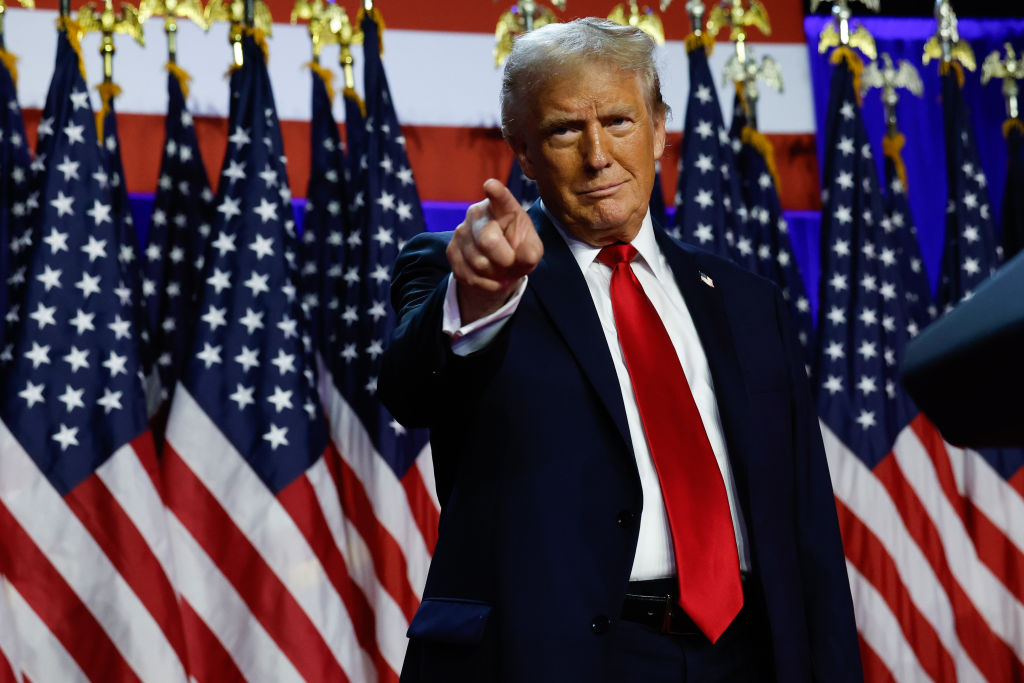What Trump's presidential election win means for the US economy
What will Trump's US presidential election win actually mean for Americans and the rest of the world?


Get the latest financial news, insights and expert analysis from our award-winning MoneyWeek team, to help you understand what really matters when it comes to your finances.
You are now subscribed
Your newsletter sign-up was successful
Want to add more newsletters?

Twice daily
MoneyWeek
Get the latest financial news, insights and expert analysis from our award-winning MoneyWeek team, to help you understand what really matters when it comes to your finances.

Four times a week
Look After My Bills
Sign up to our free money-saving newsletter, filled with the latest news and expert advice to help you find the best tips and deals for managing your bills. Start saving today!
Donald Trump won the US presidential election, gaining 295 electoral votes to Kamala Harris’s 226. It also looks possible that the Republicans could win the “trifecta”: the presidency, Senate and the House of Representatives (which remains one to watch out for).
Trump is on track to win the popular vote too, the first time a Republican has won majority support since George W. Bush in 2004. In his victory speech, Trump celebrated his “magnificent victory” and promised a “golden age” for America. The dollar, US bond yields and stock futures jumped. So-called “Trump trades”, such as US bank stocks, electric car maker Tesla and bitcoin, also rose. Centrists who had predicted an easy win for Harris were not so perky.
How did Trump win the US presidential election?
Why did American voters do it? says Edward Luce in the Financial Times. “A large part of the story” is simply that a sufficient number of them “want what Trump is selling” – a stricter line on immigration, an end to globalisation, inflation and war, and to give “a middle finger” to the liberal elite’s “often self-parodying approach to identity, better known as wokeness”. To get that, they were prepared to overlook his flaws and the risk of giving him power.
MoneyWeek
Subscribe to MoneyWeek today and get your first six magazine issues absolutely FREE

Sign up to Money Morning
Don't miss the latest investment and personal finances news, market analysis, plus money-saving tips with our free twice-daily newsletter
Don't miss the latest investment and personal finances news, market analysis, plus money-saving tips with our free twice-daily newsletter
The risk looks considerable. Trump made many worrying promises on the campaign trail, says The Times. He pledged mass deportation of illegal immigrants, thought to number in excess of 11 million; to end US involvement in the war in Ukraine; to hike tariffs to 10% on all imports and to 60% on everything from China; to have a say in the policy of the Federal Reserve; to introduce an oil policy, which he summed up as “drill, baby, drill”; to “fundamentally reevaluate” the purpose of Nato and get Taiwan to pay the US for defending it; and much more. The economic effects of the tariffs alone are “literally incalculable”. But as ever with Trump, it is hard to know what to take literally. The threats are at least in part negotiating tactics to win concessions from other countries.
What does it mean for the US economy?
Whatever he does, the US economy is “in for a wild ride”, says Mark Niquette on Bloomberg. Most economists predict higher inflation and slower growth as a result of his measures. But Trump boosters say the negative projections don’t account for the economic growth that his deregulatory agenda and plans to boost energy production will bring, not to mention his promise to make permanent the tax cuts he pushed through in 2017.
There will be winners and losers. Europe, a likely victim of the tariffs, is one loser – the euro fell on news of Trump’s win. The UK, too, should be worried. “We now face the prospect of an even more competitive US economy sucking in money from the rest of the world,” says John Stepek, also on Bloomberg. “That’s going to throw our own uninspiring growth into sharp relief at a time when there seems to be little interest in improving things.” “A new story is unfolding,” says Tom McTague on Unherd. “We are back in Trump’s world and we don’t yet know what he is going to do with it.”
This article was first published in MoneyWeek's magazine. Enjoy exclusive early access to news, opinion and analysis from our team of financial experts with a MoneyWeek subscription.
Get the latest financial news, insights and expert analysis from our award-winning MoneyWeek team, to help you understand what really matters when it comes to your finances.

Stuart graduated from the University of Leeds with an honours degree in biochemistry and molecular biology, and from Bath Spa University College with a postgraduate diploma in creative writing.
He started his career in journalism working on newspapers and magazines for the medical profession before joining MoneyWeek shortly after its first issue appeared in November 2000. He has worked for the magazine ever since, and is now the comment editor.
He has long had an interest in political economy and philosophy and writes occasional think pieces on this theme for the magazine, as well as a weekly round up of the best blogs in finance.
His work has appeared in The Lancet and The Idler and in numerous other small-press and online publications.
-
 Early signs of the AI apocalypse?
Early signs of the AI apocalypse?Uncertainty is rife as investors question what the impact of AI will be.
-
 Reach for the stars to boost Britain's space industry
Reach for the stars to boost Britain's space industryopinion We can’t afford to neglect Britain's space industry. Unfortunately, the government is taking completely the wrong approach, says Matthew Lynn
-
 Reach for the stars to boost Britain's space industry
Reach for the stars to boost Britain's space industryopinion We can’t afford to neglect Britain's space industry. Unfortunately, the government is taking completely the wrong approach, says Matthew Lynn
-
 "Botched" Brexit: should Britain rejoin the EU?
"Botched" Brexit: should Britain rejoin the EU?Brexit did not go perfectly nor disastrously. It’s not worth continuing the fight over the issue, says Julian Jessop
-
 'AI is the real deal – it will change our world in more ways than we can imagine'
'AI is the real deal – it will change our world in more ways than we can imagine'Interview Rob Arnott of Research Affiliates talks to Andrew Van Sickle about the AI bubble, the impact of tariffs on inflation and the outlook for gold and China
-
 Tony Blair's terrible legacy sees Britain still suffering
Tony Blair's terrible legacy sees Britain still sufferingOpinion Max King highlights ten ways in which Tony Blair's government sowed the seeds of Britain’s subsequent poor performance and many of its current problems
-
 How a dovish Federal Reserve could affect you
How a dovish Federal Reserve could affect youTrump’s pick for the US Federal Reserve is not so much of a yes-man as his rival, but interest rates will still come down quickly, says Cris Sholto Heaton
-
 New Federal Reserve chair Kevin Warsh has his work cut out
New Federal Reserve chair Kevin Warsh has his work cut outOpinion Kevin Warsh must make it clear that he, not Trump, is in charge at the Fed. If he doesn't, the US dollar and Treasury bills sell-off will start all over again
-
 How Canada's Mark Carney is taking on Donald Trump
How Canada's Mark Carney is taking on Donald TrumpCanada has been in Donald Trump’s crosshairs ever since he took power and, under PM Mark Carney, is seeking strategies to cope and thrive. How’s he doing?
-
 Rachel Reeves is rediscovering the Laffer curve
Rachel Reeves is rediscovering the Laffer curveOpinion If you keep raising taxes, at some point, you start to bring in less revenue. Rachel Reeves has shown the way, says Matthew Lynn